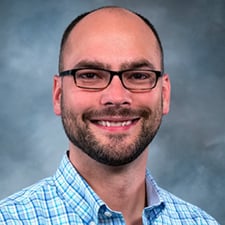As a medical student, do you ever wonder what it’s like to specialize in family medicine? Meet Jordon Despain, MD, a family medicine specialist and a featured physician in the AMA’s “Shadow Me” Specialty Series, which offers advice directly from physicians about life in their specialties. Check out his insights to help determine whether a career in family medicine might be a good fit for you.
The AMA’s Specialty Guide simplifies medical students’ specialty selection process, highlights major specialties, details training information, and provides access to related association information. It is produced by FREIDA™, the AMA Residency & Fellowship Database®.
Learn more with the AMA about the medical specialty of family medicine.
“Shadowing” Dr. Despain
Specialty: Family medicine.
Practice setting: Multi-specialty group.
Employment type: Partner in a multi-specialty group in Central Washington affiliated with Confluence Health, which is a member of the AMA Health System Program. The program provides enterprise solutions to equip leadership, physicians and care teams with resources to help drive the future of medicine.
Years in practice: Seven.
A typical day and week in my practice: It is difficult to describe a typical day in family medicine because there is so much variety. My typical workday is seeing 20–24 patients with a wide variety of medical problems. There is a lot of helping people control their diabetes and hypertension, as well as doing well-child checks and minor procedures, such as joint injections, skin excisions and lump removal. I like that a typical day will include people of all ages with lots of different kinds of problems.
I work four days a week, and I am also the manager of our physician group, so I have a half day of administration time.
The most challenging and rewarding aspects of family medicine: For me, the most challenging aspect of caring for patients is when the only thing I can do is listen when they have no options for treatment or when extensive evaluation has not revealed a cause for their problems. Another challenge is limited support for behavioral health. I wish it were easier to get my patients help with their mental health, beyond what I can do.
I find it very rewarding to help people make meaningful changes in their lives for the better. For example, I feel really good about helping people find ways to quit smoking or start exercising. These kinds of changes have a big impact on a person’s life.
The impact burnout has on family medicine: Burnout is very real. There are many doctors leaving primary care for other opportunities. Sometimes the work can be frustrating, and the amount of work that is not directly related to patient care can be a burden.
How Confluence Health is reducing physician burnout: We have a great system for support of physicians who are struggling. Through a third-party group, we have ready access to counseling, coaching and concierge services. We also have groups of physicians from throughout the group who regularly get together and have dinner.
How my lifestyle matches, or differs from, what I had envisioned: My lifestyle is largely what I envisioned while I was in medical school, although I did not expect to work four days a week. I thought I’d be working five days a week. I think I have a little more time to travel than I expected as well. I have four kids, and the first was born the year before I started medical school, so that really forced me to find a balance between work and family, which has been valuable to me. I think it can be easy to be consumed by medical learning and practice, so it is important to find ways to continue being who you are outside of medicine.
Skills every physician in training should have for family medicine but won’t be tested for on the board exam: I think some of the skills that are important in family medicine but won’t be tested for are the ability to listen in a way that people feel heard and the aptitude for shared decision-making.
Regarding the former, there are a lot of people who feel better after having someone really listen to them—you may have experienced that in your own life—and I think that is especially important in family medicine.
On the latter, the focus during medical training is often on getting to the right answer, but in clinical practice, there are often lots of right answers. Frequently, finding what the patient is willing to do among those right answers is more important than what a multiple-choice question could elucidate about your knowledge. The combination of your knowledge and the patient’s lived experience can go a long way to improving their health and the therapeutic relationship.
Books, podcasts or other resources every medical student interested in family medicine should be reading:
- How Doctors Think, by Jerome Groopman, MD. It is a great analysis of the thought processes that go into patient care.
- Crucial Conversations: Tools for Talking When Stakes Are High, by Kerry Patterson. This provides a framework for helping people who disagree but need to work together—for example, you and your patients, you and your colleagues, you and administrators, and you and your family members.
- The Five Dysfunctions of a Team: A Leadership Fable, by Patrick Lencioni. Learn the basics of team function. You will be working in teams for the rest of your career.
Additional advice I would give to students who are considering family medicine: I think the most important thing is to spend some time doing it. I didn’t fall in love with family medicine until I did my rotation and could tell it was the right fit.





